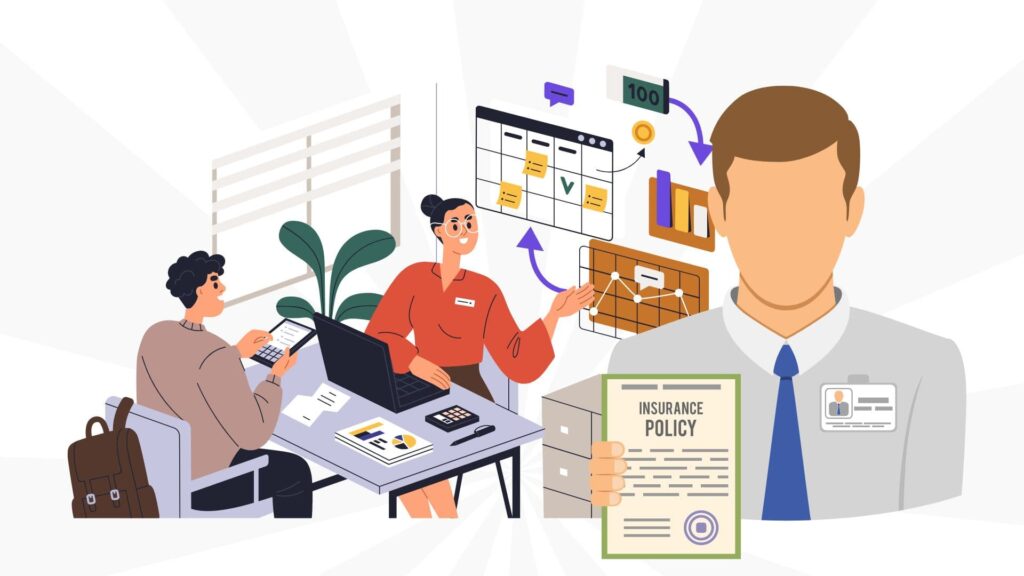
Sammie Ellard-King
I’m Sammie, a money expert and business owner passionate about helping you take control of your wallet. My mission with Up the Gains is to create a safe space to help improve your finances, cut your costs and make you feel good while doing it.

Quickfire Roundup:
Financial advisers are great for people who want a hands-off approach to managing their money but it comes at a cost.
These days if you’re willing to put a little bit of time in then there are ready-made products that can essentially do a lot of the work for you.
While many of us may have heard of them, it’s common to wonder if you need independent financial advice.
In reality, the answer to this question will often be a resounding “It depends”. The truth is that there is no one size fits all answer.
Whether or not you need a financial advisor will depend upon your circumstances. These circumstances can change so your need for a financial adviser is likely to change too.
In this article, we’re going to try to answer some of the most common questions that we’ve heard such as:
- Do I need a financial advisor?
- Does a financial advisor cost money?
- What do they actually do for you?
- Where can I find one safely?
Table of Contents
Why do I need a financial advisor?
While you may not always need the services of a financial adviser, there are plenty of times when seeing one can be beneficial. Some of the occasions when this could be useful include:
- You’re looking into consolidating legacy ISAs
- You’ve inherited money
- You want to plan for the financial future of your children
- You’re exploring ways that you can pass money on to friends and family
- You’re looking at moving from one pension provider to another
- You’re going through a divorce or separation and need to separate assets like investments or ISAs
- There has been a death in the family
- You want to know how best to invest
- You’re thinking about consolidating pension pots
As you can see, there’re plenty of times when you could benefit from professional financial advice.
Even those who have savings could see some benefits by exploring maximising ISA tax allowances through the use of ISAs and SIPPs.
It was once the case that financial advisors were seen to exist for the extremely wealthy. Those who had lots of money to invest were looking at ways to get even richer. However, this has now changed.
A financial advisor has just as much to offer someone with an average income as they do the mega-rich.
Can't I just manage my finances myself?

Of course, managing your finances for yourself is an option.
If your savings are almost non-existent, there are no major life events coming up, and you don’t have a private pension, managing your own finances may well be the best option.
Financial advisers cost money, so it may not be worth the expense if that description sounds like you.
That being said, there is a middle ground that can be taken. This allows you to receive expert financial advice without the fees involved with a financial adviser.
Let’s take a look at what these options are:
Free to access websites and services
The great thing about the internet is that it contains an abundance of free resources covering almost anything you can think of.
Some great sites that, backed by the government and charities, offer great advice when it comes to managing money. Some of the top sites worth visiting are:
• The Money Advice Service – this website has a whole range of information that relates to managing debts, mortgages, and savings. There are a host of useful calculators that you can use and real humans to help you seek financial advice
• Pension Wise – aimed at people aged 50 and over, this is a site that offers advice on both personal and workplace pensions. They offer telephone and face-to-face appointments
• The Pension Advisory Service – here you get to discuss all things pension related. You can choose to fill out an enquiry form, speak on the phone, or chat via the live chat function. There is also a whole host of information on the website
• Citizens Advice – this charity provides free advice in a wide range of areas. There is plenty to read over in terms of finances and you can also arrange to speak to someone if you need further advice
Using robo-advisors
There are plenty of online platforms and mobile apps that allow you to make investments. Some of these, such as Wealthify and Plum, offer robo-advisor services.
By answering some basic questions, these advisors use an algorithm that helps to build a portfolio that suits your needs.
There are also brands like Moneyfarm that while classified as a robo-advisor also offers real human advice as part of their service.
While there are fees involved, these are much lower than what you’d pay to see a traditional financial advisor.
Consolidating your pensions
Over 78% of us have or had a workplace pension with over half of that number not knowing how many pensions they have.
I consolidated my five different pensions (yes five!) after finally getting round to doing so.
Financial advisors can help you do this but there are options out there like PensionBee that do all the hard work for you.
Of course, managing your finances for yourself is an option.
If your savings are almost non-existent, there are no major life events coming up, and you don’t have a private pension, managing your own finances may well be the best option.
Financial advisers cost money, so it may not be worth the expense if that description sounds like you.
That being said, there is a middle ground that can be taken. This allows you to receive expert financial advice without the fees involved with a financial adviser.
Let’s take a look at what these options are:
Free to access websites and services
The great thing about the internet is that it contains an abundance of free resources covering almost anything you can think of.
Some great sites that, backed by the government and charities, offer great advice when it comes to managing money. Some of the top sites worth visiting are:
• The Money Advice Service – this website has a whole range of information that relates to managing debts, mortgages, and savings. There are a host of useful calculators that you can use and real humans to help you seek financial advice
• Pension Wise – aimed at people aged 50 and over, this is a site that offers advice on both personal and workplace pensions. They offer telephone and face-to-face appointments
• The Pension Advisory Service – here you get to discuss all things pension related. You can choose to fill out an enquiry form, speak on the phone, or chat via the live chat function. There is also a whole host of information on the website
• Citizens Advice – this charity provides free advice in a wide range of areas. There is plenty to read over in terms of finances and you can also arrange to speak to someone if you need further advice
Using robo-advisors
There are plenty of online platforms and mobile apps that allow you to make investments. Some of these, such as Wealthify and Plum, offer robo-advisor services.
By answering some basic questions, these advisors use an algorithm that helps to build a portfolio that suits your needs.
There are also brands like Moneyfarm that while classified as a robo-advisor also offers real human advice as part of their service.
While there are fees involved, these are much lower than what you’d pay to see a traditional financial advisor.
Consolidating your pensions
Over 78% of us have or had a workplace pension with over half of that number not knowing how many pensions they have.
I consolidated my five different pensions (yes five!) after finally getting round to doing so.
Financial advisors can help you do this but there are options out there like PensionBee that do all the hard work for you.

What exactly can a financial advisor help with?
There are many services a financial adviser can give alongside the normal financial planning you associate them with.
Let’s look into some of the common uses here:
Tax planning
If you’re looking at ways to make some significant savings, a financial advisor can help you here.
An advisor who specialises in the area of tax is best placed to tell you how to make the most of all of the allowances that exist and how you can utilise all of the available tax breaks.
Planning for your retirement
It’s difficult to think ahead to something that might seem far off but it’s important to try and begin thinking about it as early as possible.
Pensions are less than simple and you need to be sure that you’re making your retirement as comfortable as possible. Here’s a look at just some of the ways that a financial advisor could help:
- Assist you with setting up your pension
- Invest in your pension
- Help you to achieve your goals when it comes to how much you need in your pension pot to retire comfortably
- Offer advice on whether you should buy an annuity
- Help to manage your pension when you’re in drawdown. The expertise in this area ensures that you don’t outlive your funds!
Given the need to have sufficient funds to retire, this is one area where a good financial advisor is well worth the investment.
Estate planning
No one likes to think about dying but the more thought that you give it now, the easier you’ll make things for your family.
A financial advisor is best placed to plan how you will pass on any wealth to those that you leave behind.
Just some of the benefits that a financial advisor can bring in this area include:
- Explaining how gifting works including how much you can gift and when you should do it
- Planning for inheritance tax
- Ensuring that you have a will in place
- Assisting with the setup and ongoing management of trusts
Investments
While there are plenty of online options to explore, a financial advisor can still be a useful asset when it comes to making investments.
Some will operate by carrying out their own fund selection whereas others will appoint a third party to manage a portfolio.
Initially, you can expect a financial advisor to go quite deep into your financial situation so be ready to answer some difficult questions.
Without this information, it’s very difficult for an advisor to make investment recommendations.
Equally, you’ll want to know all about ISAs and if you should be paying into a SIPP or an ISA.
Mortgages
Finding the best mortgage deal isn’t always easy. A financial advisor can help you here and can be particularly useful if you’re self-employed or perhaps have a less than perfect credit rating.
Using the services of an expert in this field can ensure that you get the right product and aren’t paying any more than you need to.
A Financial MOT
Will I be better off if I see a financial advisor?
If these are minimal then the best advice is to save yourself the fee and explore some of the other options that we’ve looked at.
There are some instances when you may come away from a financial adviser and not immediately see any benefits.
If you are taking a new approach to your tax, estate planning, investment strategy, or investing in a new pension, it will take time before you reap those benefits.
Of course, that doesn’t mean that those benefits don’t exist.
There is research to show that using a financial advisor does pay dividends.
One report shows that investors who took advice between 2001 and 2007 were around £40,000 better off, between 2012 and 2014 than those who didn’t receive advice.
Does a financial advisor cost money?
We’ve already hinted at this a few times, but yes a financial advisor will cost you money.
How much depends on the financial advisor that you’re seeing and the type of advice that you’re going to receive.
The average hourly rate charged by a financial advisor is around £150, but this can vary hugely depending on the nature of the service. There are plenty of financial advisors in the UK who command £350 per hour!
You will pay different fees if you’re exploring your pension options. The average cost of an initial review comes in at £500.
However, if you’re seeking advice on a pension pot that is worth £100,000 you’ll be charged around £1,000 for the privilege.
Finanical advisers that help with mortgage planning, some will charge you a fee while others will work on a commission from the lenders. Often, you will find that they actually do both and so earn at both ends of the deal.
If you’re thinking about buying your first home or beginning to save for a house deposit then you might consider professional help.

Where can I find a financial advisor?
You’re bound to be able to find a certified financial planner who is local to you. The key is to find one that is reputable and can be trusted but also takes into consideration your personal circumstances and provides unbiased advice.
When it comes to choosing the right one for you, these are some of the things that you’ll need to consider:
- How are you charged – is it hourly or a flat fee?
- What are the total costs including the likes of trading
- Are they recommended? Do you know anyone who has used them before or can you find reviews online?
- Is their investment process simple and easy to understand?
- Are they experienced in the area that you want advice in?
if you’re still unsure, it may be worth taking a look at WayFinder.
FAQs
How much money should you have before getting a financial advisor?
There is no set amount, but you should consider that you’ll be paying an independent financial adviser for their time and a yearly percentage.
Most experts advise that when you’re consistently saving 20% of your income or are earning over £50,000 a year, then consider seeking financial advice.
At what point is it worth getting financial advice?
If you want a completely hands-off approach to managing your investments and retirement strategies, then consider a financial advisor.
There is no set point, you could be starting right from the beginning all the way up to taking advice on how to drawdown a pension.
How long should you stay with a financial adviser?
It is advisable to leave at least 5 years before you should expect any results. If your financial adviser is investing your money, then underperformance in the stock market will be entirely out of their control.
If you’re considering this avenue, think long-term rather than needing results in the first year or two.
How much does a good financial adviser cost?
Financial advisers charge either by the hour or by taking a percentage of your investments.
Good financial advisors can cost upwards of £150 per hour or take 2-3% a year of your overall investments.
The FCA (financial conduct authority) advises no larger than 2.4% for initial advice.
Final thoughts
Hopefully, you can see the value that a good financial adviser is able to bring. They are certainly worth the investment when it comes to looking at ways to grow your wealth and plan for your future.
However, as we have seen, they are not necessarily suitable for everyone.
Retail investors (people like you and I) now can find most of the info online so it really comes down to how much you want to take control of your own finances or if you’re happy to let someone do it for you.
If a financial advisor isn’t right for you, just be sure to check out the other options that are available to you.
The way that technology has developed, and the websites and apps on offer, mean that there is no need for anyone to go it alone. There are numerous sources of advice and guidance to be found.
Share on social media
2 thoughts on “Do I Need a Financial Advisor for 2024?”
Leave a Comment Cancel Reply
The information found on this website does not constitute financial advice. Up the Gains is a media, opinion and information based website.
Always do your own research before making any kind of financial decision.
Our content, website and products are created with the utmost care and quality, and our goal is to help others find answers to their issues.
If you click on one of our affiliate links and go on to make a purchase, then we may receive a small commission for introducing you to that brand. This does not affect the information you receive as we’ll always give an honest and impartial viewpoint on any product we review.
For further information please refer to our privacy policy.
Up the Gains is a registered company in the UK. Company Number 13881251 | Copyright © 2023 Up The Gains | Powered by Up The Gains




Great article on whether or not someone needs a financial advisor! I appreciate the balanced approach in weighing the pros and cons of having a financial advisor, and providing information to help readers make an informed decision. The explanations of the different types of financial advisors and the services they provide are clear and informative, as well as the point of importance of financial literacy and being self-sufficient.
I also liked the emphasis on being aware of the costs associated with financial advisors, and the importance of finding a qualified and trustworthy advisor. It’s important to understand the level of service you require and the fees you will be charged. The tips on how to evaluate and interview a potential advisor and finding the right fit for you, are also very valuable.
Overall, this is a valuable resource for anyone who is considering working with a financial advisor or is looking to make an informed decision about their finances. The article provides valuable information, expert insights, and clear explanations, that can help to navigate this topic.
Thank you Philip – I really appreciate the comment!